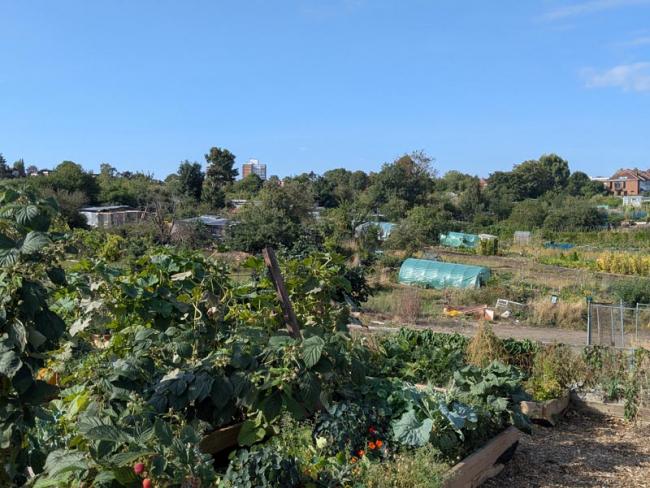28 August 2025

Allotments, north London – a valuable part of food production and of community life. Photo Workers.
Deputy prime minster Angela Rayner prompted a storm of outrage when it emerged that she has eased the way for councils to sell off allotments.
This is an unexpected effect of the planning changes she announced in March. The threat is real, despite government assurances.
Benefits
Critics of all sorts have been vocal in pointing out the many benefits of allotment use. These include the health and exercise boost that comes with working outdoors, the value of fresh vegetables, and the opportunity for people, many elderly, to socialise at their leisure.
According to a report in the Guardian on 5 August, the National Allotment Society (NAS) cautioned that headlines predicting the demise of the allotment were alarmist. NAS said that many protections were already in place and, as a consultee on allotment closures, it will always ensure due process is followed.
‘Protections are not strong.’
Those protections are not strong which is a concern to those fearing for the future of their allotments. The worry is that the drive for housing will trump the evident utility of the land for allotment holders.
They will know Rayner created a “grey belt” planning category, carved out of green belt land – and destined for housing – hoping that label (and changes to the rules) would stifle opposition.
Opportunity
If cash-strapped local councils, (the majority) see an opportunity to raise money by selling allotments to a developer, they must apply to the secretary of state (Rayner) for permission.
But once a site is seen to be under threat in that way, many allotment holders will abandon it. And eventually it will meet the legal threshold for sale as being “underutilised”. That’s the sort of approach slum landlords and dodgy developers use.
Limited value
There is a requirement for alternative space to be made available. That’s of limited value with no guarantee of a suitable location or plot size. And waiting lists for existing allotments can be long.
The government has approved eight sites for sale since it came to power. The NAS, which describes its role as promoting and protecting allotments, has challenged none of them, accepting they met legal thresholds.
Defensive
That’s a narrow and defensive approach; complacent in that the level is similar to recent years, but ignoring the planning changes and pressures on councils.
On the other hand, there is a petition to Rayner running under the banner “Hands off our allotments” from “We Own It”. That group argues for increasing the availablity of allotments rather than carving out plum sites for developers to build houses.
